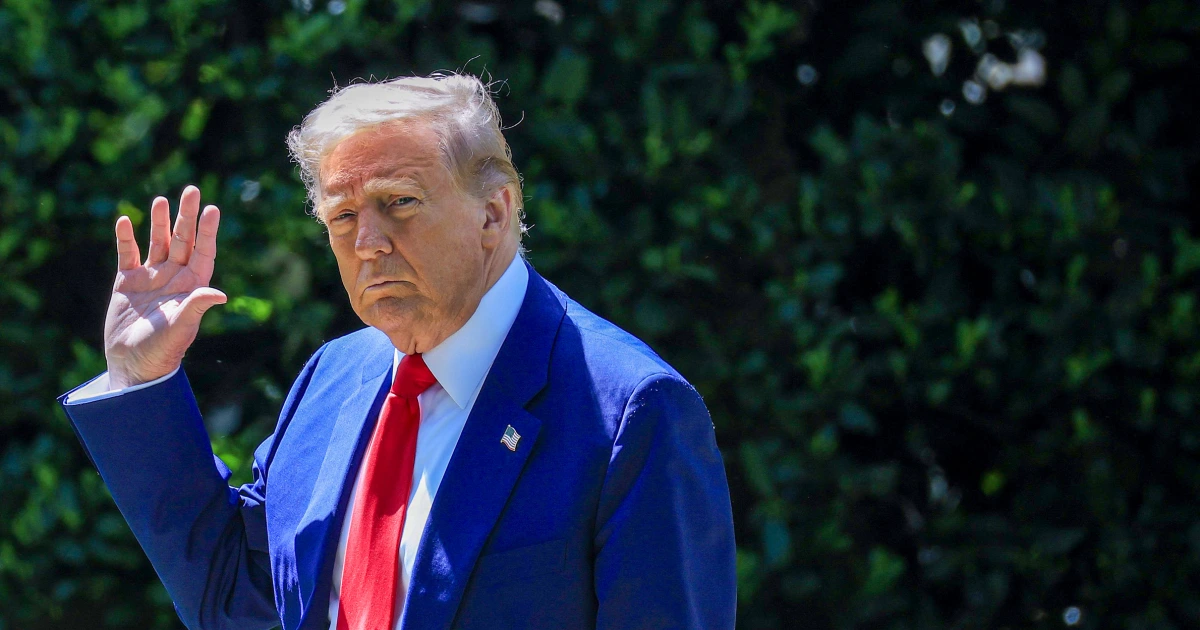President Donald Trump’s first 100 days in office have been the worst for the stock market since Richard Nixon’s administration, with significant drops following his tariff announcements.
But according to Trump, it’s all Joe Biden’s fault.
“This is Biden’s Stock Market, not Trump’s,” he posted on Truth Social on Wednesday morning. “I didn’t take over until January 20th. Tariffs will soon start kicking in, and companies are starting to move into the USA in record numbers.”
“Our Country will boom, but we have to get rid of the Biden ‘Overhang,” he added. “This will take a while, has NOTHING TO DO WITH TARIFFS, only that he left us with bad numbers, but when the boom begins, it will be like no other. BE PATIENT!!!”
Trump appeared to be responding to Wednesday’s Commerce Department report showing the U.S. economy contracted 0.3% in the first quarter of 2025, the first negative reading since 2022. In the wake of the report, which also showed inflation remaining firm, stocks plunged.
Trump made similar remarks urging patience Wednesday during a meeting with his Cabinet, urging critics to “give us a pass on the first month,” saying that they were “getting used to things, right?”
“You probably saw some numbers today, and I have to start off by saying that’s Biden — that’s not Trump — because we came in on January,” Trump said. “We came in and I was very against everything that Biden was doing in terms of the economy … We took over his mess in so many different ways.”
The data contradict Trump’s assessment of the stock market. The S&P 500 actually soared after Trump’s election victory, indicating optimism from Wall Street about where he would take the economy.
At the time, Trump was more than happy to take credit for the market fluctuations.
“Everyone is calling it the — I don’t want to say this. It’s too braggadocious, but we’ll say it anyway — the Trump effect,” Trump said during a rally in Washington, D.C. on the eve of his inauguration. “It’s you. You’re the effect. Since the election, the stock market has surged, and small business optimism has soared, a record 41 points to a 39-year high.”
But stocks tumbled in the wake of Trump’s shock “Liberation Day” announcement on April 2, in which he announced country-by-country tariff levels far beyond what investors had anticipated. Even after he announced their suspension for 90 days, markets continued to convulse as it became clear Trump’s attempts at reaching individual trade deals faltered.
Trump then shifted his tone.
“You can’t really watch the stock market,” Trump said in a Fox News interview in early March. “If you look at China, they have a 100-year perspective. We have a quarter. We go by quarters.”
In an interview with ABC News Tuesday, Trump also suggested that during the campaign, he had prepared the country for a tough “transition period” — even though he had made explicit Day One promises about restoring economic prosperity.
Trump continues to frequently invoke Biden on matters big and small, from the economy to foreign policy to the Easter Bunny. But recent surveys show that voters largely attribute current economic conditions to Trump’s policies.
In a CNBC poll, 54% of adults see a negative impact of Trump’s policies, now or in the future, while 60% of registered voters in an NPR/PBS News/Marist Poll said Trump was responsible for the current economic conditions. An equal number of registered voters in a New York Times/Siena College poll blamed Trump and Biden for the biggest challenges facing the economy, showing warning signs for the new president.
Former Biden White House aide Andrew Bates criticized Trump’s comments later Wednesday.
“Joe Biden publicly warned Trump against raising the prices he promised to lower with tariffs, which are now the biggest middle class tax increase in modern history,” Bates said. “Donald Trump is the only president to have sent a strengthening economy into a nosedive in 100 days, and the only president to have bankrupted a casino.”
Rob Wile and Peter Alexander contributed.
